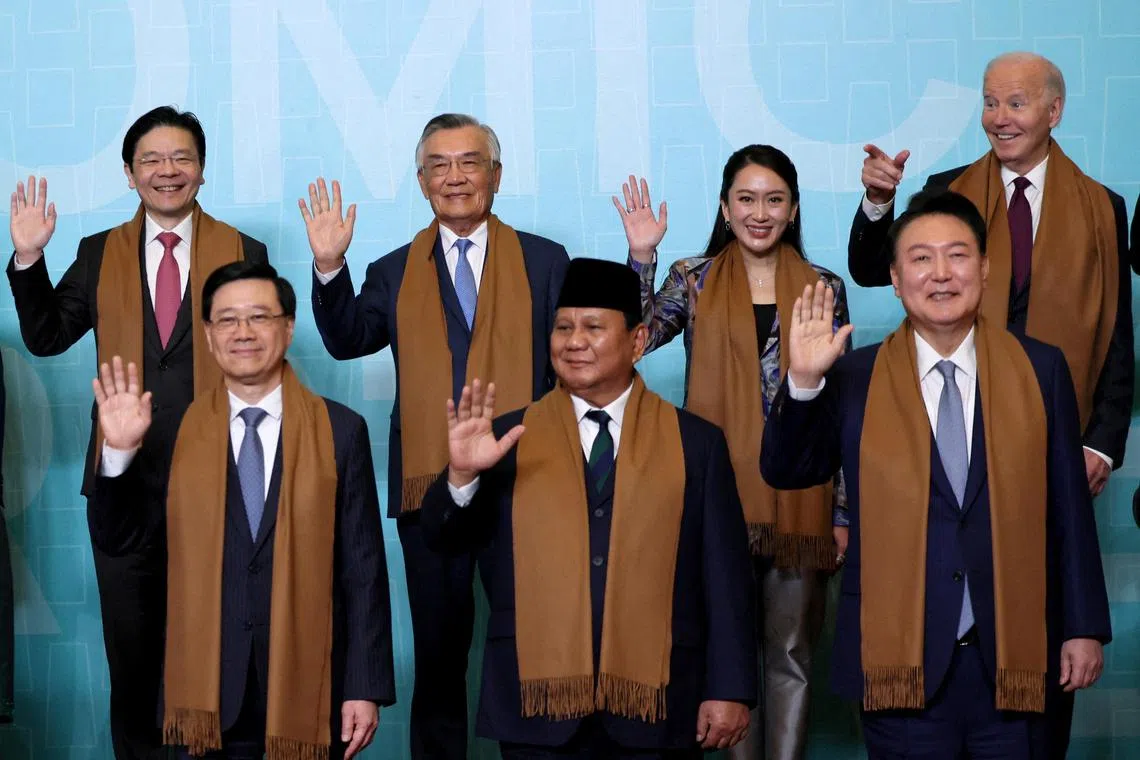Singapore offers to host Apec summit in 2030

SINGAPORE has offered to host the Asia-Pacific Economic Cooperation (Apec) summit in 2030, said Prime Minister Lawrence Wong on Saturday (Nov 16).
This is one way that the Republic will contribute to ensuring more inclusive growth, against a backdrop of increasing geopolitical rivalry and weakening support for free trade, he added.
“We find Apec to be a very valuable platform, and we will do our part to support Apec in different ways, including the hosting of Apec summits,” he told reporters at the close of this year’s summit in the Peruvian capital Lima.
Singapore is a part of the 21-member Apec, which includes major world powers such as the US, China and Russia and whose economies make up close to half of global trade. The last time the Republic hosted an Apec summit was in 2009. The summit will be held in South Korea in 2025, China in 2026, and Vietnam in 2027.
PM Wong noted that across the board, there is concern at this year’s summit that support for globalisation and free trade is weakening around the world.
People in many economies of Apec feel that the fruits of free trade have not been shared equally. Meanwhile, geopolitics is resulting in more things being seen through a security lens, rather than that of win-win cooperation, he noted.
BT in your inbox

Start and end each day with the latest news stories and analyses delivered straight to your inbox.
“What can we do about this? One response would be to simply put up more barriers,” he observed. “But it’s good that the Apec economies across the board reject that response, and feel that the right way to go about dealing with these concerns is to double down on our trade and investment links, make sure that trade works for the benefit of all our peoples, and find ways to make growth more inclusive.”
This is an important conclusion from this year’s Apec meetings, added PM Wong, who was attending the summit for the first time as prime minister.

In their joint declaration at the summit’s close, Apec leaders reaffirmed their countries’ support for the rules-based multilateral trading system, with the World Trade Organization at its core. They also recommitted to advancing economic integration in the Asia-Pacific and to keep working to deliver an open, inclusive and predictable trade and investment environment.
Even with consensus on trade and tackling climate change, Apec economies are not able to move at the same pace as they face different constraints, such as domestic considerations. “We recognise that not everyone can move in tandem, and so we will try to gather like-minded economies to move first,” said PM Wong.
He emphasised that Apec is important to Singapore not just for trade and investment, but also as an incubator for ideas in areas such as supply chains, the digital economy and sustainability. The grouping is where small, open economies such as Singapore have often come together to be pathfinders, he noted.
This was the case with the P4 – the collective term for Brunei, Singapore, Chile and New Zealand – which inked a free trade agreement in 2005. This set the stage for the Comprehensive and Progressive Agreement for Trans-Pacific Partnership signed by 11 countries in 2018.
Chile, New Zealand and Singapore have partnered again on trade in the green economy, he said. A joint working group set up among them will look at rules and standards on green solutions, with the aim of fostering more cross-border trade in low carbon activities. “If we are able to put in place this framework, hopefully this can eventually grow into another international initiative,” he added.
PM Wong also expressed his hopes for US-China ties under incoming president Donald Trump. He noted the deep mutual mistrust and suspicion on both sides, which has resulted in the relationship between both countries being put in “a very difficult and challenging position”.
At the same time, leaders from both countries have agreed on “guard rails” to prevent ties from going down the path of no return. For instance, they know each other’s red lines on thorny issues such as Taiwan and the South China Sea, and have established a mutual understanding so as not to escalate these issues, he pointed out.
The US and China have also been able to work together in areas of shared interest, such as climate change, said PM Wong. He hopes China will be able to establish similar guard rails with the new Trump administration, which will reduce the risk of miscalculation and conflict between the two powers. Doing so will allow both countries to continue engaging on multiple fronts, even as there is fierce competition between them and their views differ in many areas, he said. “To the extent that Singapore can help, we will certainly do our part to facilitate,” he added.
With the Apec Summit over, PM Wong flew to Rio de Janeiro in Brazil to attend the Group of 20 (G-20) summit from Sunday to Wednesday. The leaders attending this year’s event include outgoing US President Joe Biden and Chinese President Xi Jinping. The discussions are expected to be dominated by political differences over ongoing wars in the Middle East and Ukraine. Other topics on the agenda include the fight against global hunger and poverty, as well as the reform of the United Nations, World Bank and other international institutions. THE STRAITS TIMES

